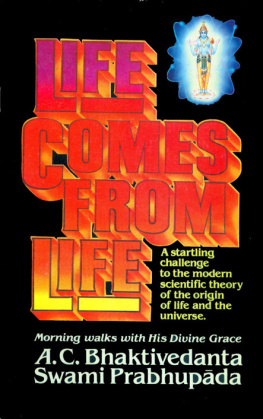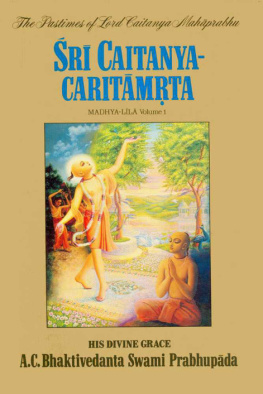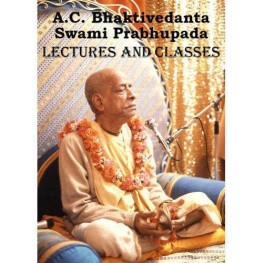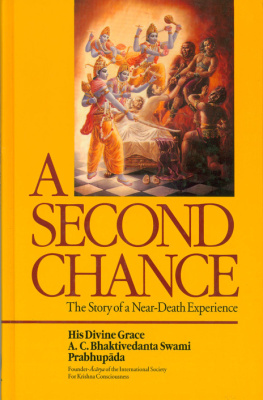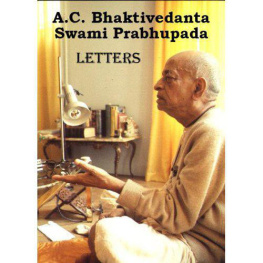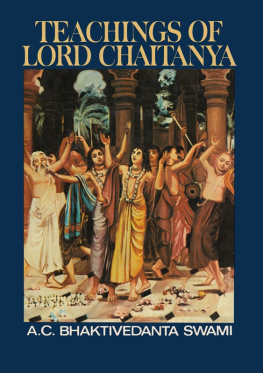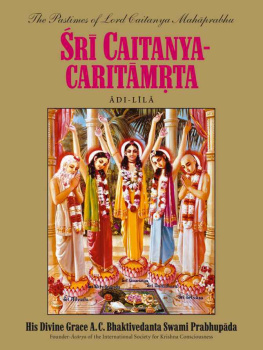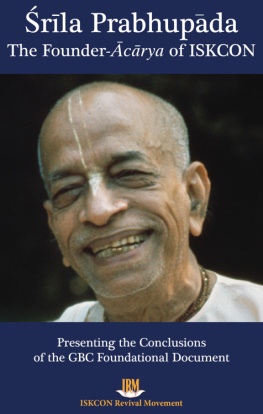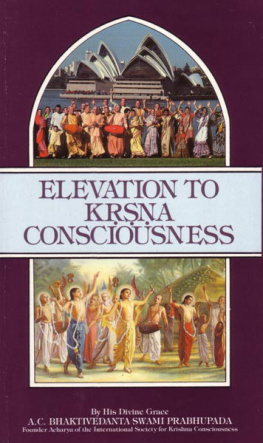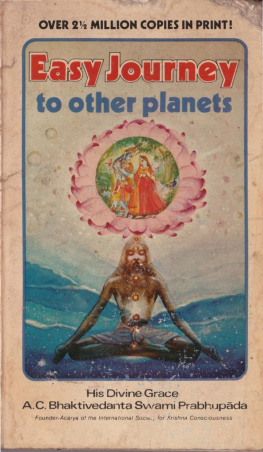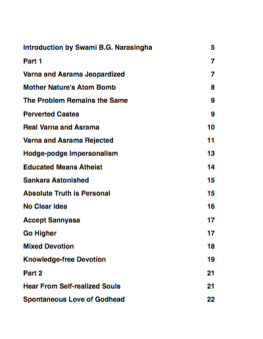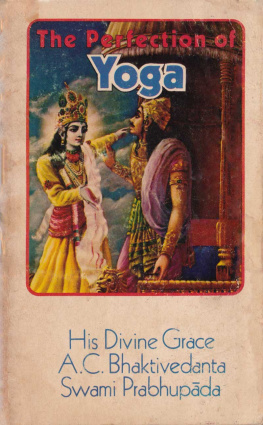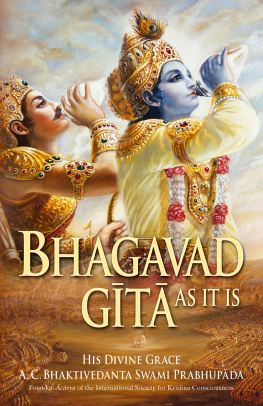Life Comes from Life
LCFL Foreword
Foreword
For people who have come to accept every pronouncement of modern scientists as tested and proven truth, this book will be an eye-opener. Life Comes From Life is an impromptu but brilliant critique of some of the dominant policies, theories and presuppositions of modern science and scientists by one of the greatest philosophers and scholars of the century, His Divine Grace A. C. Bhaktivedanta Swami Prabhupda. rla Prabhupda's vivid analysis uncovers the hidden and blatantly unfounded assumptions that underlie currently fashionable doctrines concerning the origins and purpose of life.
This book is based on taped morning-walk conversations that rla Prabhupda had with some of his disciples during 1973, in the Los Angeles area. On those mornings when he focused on science, rla Prabhupda spoke mainly with his disciple Thoudam D. Singh, Ph.D. An organic chemist, Dr. Singh presently directs the Bhaktivedanta Institute, an international center for advanced study and research in science, philosophy and theology.
Each day, wherever in the world he happened to be, rla Prabhupda would go out for a lengthy stroll in the chill quietude of the early morning, and cloaked in a warm wrap, he would share intimate moments with a small group of students, disciples and special guests. Some mornings found him immersed in contemplation or quiet appreciation of the surroundings, and little dialogue emerged. At other times he spoke at great length, and often with considerable intensity, on various subjects. During these animated discourses he demonstrated that philosophical analysis need not be a dull, abstruse affair, but can be a dynamic cutting edge into every sphere of life. Nothing could escape his keen intellect, deep spiritual insight and uncommon wit. Rejecting superficial and dogmatic thinking, he edified, challenged, cajoled, charmed and enlightened his students, and he carefully guided them to increased insight and understanding.
rla Prabhupda (18961977) is an internationally recognized author, scholar and spiritual preceptor, and he is widely esteemed as India's greatest cultural ambassador to the world. In Life Comes From Life, rla Prabhupda takes the role of philosopher-social critic. With philosophical rigor, profound common sense and disarming frankness, he exposes not only modern science's methodological shortcomings and unexamined biases but also the unverified (and unverifiable) speculations that scientists present to the trusting public as known fact. Thus rla Prabhupda breaks the spell of the materialistic and nihilistic myths which, masquerading as science, have so bewitched modern civilization.
-The Publishers
Introduction
Science: Truth and Fiction
Once upon a time (as in a fairy tale), most of us believed that the food we ate was basically wholesome, nutritious and free from dangerous chemicals, that advertising may have been believable, and that product labels truly described the qualities and contents of what we fed ourselves and our families. Once upon a time, most of the world believed in the integrity of our heads of state, high-ranking political officials and local leaders. Once upon a time, we thought our children were getting a solid education in the public school system. Once upon a time, many of us believed atomic energy had "peacetime uses" that were perfectly safe and completely congruous with a happy and healthy society.
Yet in recent times our illusions have been shattered. Repeated exposes of widespread consumer fraud and grand political collusion and bribery have all but destroyed our former innocence. We now know that through mass marketing and the media, a veil of fantasy and deception can be created with such unprecedented expertise that it can become impossible for us to distinguish between substance and simulation, reality and illusion.
Today many scientists are propagating the doctrine that life originates from matter. However, they cannot provide proof, either experimentally or theoretically. In fact, they hold their stance essentially on faith, in the face of all sorts of scientific objections. rla Prabhupda points out that this groundless dogma has done great damage to moral and spiritual standards worldwide and has thus caused incalculable suffering.
Though beset by internal doubt and division, modern scientists have somehow managed to present a united front to the nonscientific public. Their behavior brings to mind the worst in political and corporate trickery. For instance, despite the recent outcry over their masking the difficulties of maintaining safety standards at nuclear power plants, the scientists and the government remain committed to nuclear power and even make light of the fact that there is no safe way of dealing with radioactive waste.
In popular works and in textbooks scientists present their account of the material origin of life as the only possible scientific conclusion. They claim that no other theory can be scientifically acceptable. And so everyone is taught that life gradually arose from chemicals, a "primordial soup" consisting of amino acids, proteins and other essential ingredients. Yet in their journals and private discussions, the same scientists acknowledge that their theory has grave, sometimes insuperable difficulties. For example, certain features of the DNA coding mechanism cast serious doubt upon the substance of evolutionary thought. The noted biologist W. H. Thorpe writes, "Thus we may be faced with a possibility that the origin of life, like the origin of the universe, becomes an impenetrable barrier to science and a block which resists all attempts to reduce biology to chemistry and physics." The highly committed evolutionist Jacques Monod has pointed out these same difficulties. Theodisius Dobzhansky, another prominent advocate of evolution, can only agree: "Our scientific knowledge is, of course, quite insufficient to give anything like satisfactory accounts of these transitions [from no life to life, from no mind to mind]. Biologists as basically different in their... views as W. H. Thorpe and Jacques Monod agree that the origin of life is a difficult and thus far intractable and unsolved problem. I concur." Dobzhansky goes on to call the origin of life "miraculous." These admissions by Dobzhansky, Monod and Thorpe are by no means unique. Yet in popular presentations and textbooks one finds little hint of such widespread doubt.
Nobel prize-winning physicist Eugene Wigner has shown that the probability of the existence of a self-duplicating unit is zero. Since the ability to reproduce is one of the fundamental characteristics of all living organisms, Wigner concludes that our present understanding of physics and chemistry does not enable us to explain the phenomenon of life. Herbert Yockey has demonstrated by information theory that even a single informational molecule such as cytochrome c (what to speak of complex organisms) could not have arisen by chance in the estimated lifetime of the earth: "One must conclude that, contrary to the established and current wisdom, a scenario describing the genesis of life on earth by chance and natural causes which can be accepted on the basis of fact and not faith has not yet been written."
As we can see, on the one hand many scientists have a deep personal commitment to the concept that life comes from matter. On the other hand they admit that they do not have the evidence to corroborate their conviction, and that their theory is beset with intractable problems. They are convinced that life arose from matter and is reducible to matter, yet at the same time they must confess to having scant scientific grounds for their conviction. Thus their theory is a priori: it supersedes the scientific method and science itself. Their fervent, almost messianic hope is that someday, somehow, someone may be able to validate it, and in the meantime their faith is unshakable.

